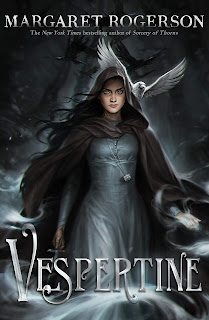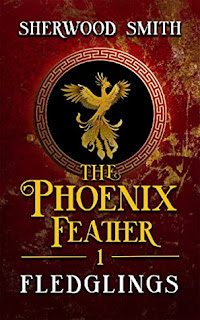I read these two novels back-to-back, and it was interesting to compare them, particularly since Iron Widow is still fairly fresh in my mind. All three have the Mulan trope at their heart: peasant girl (in Chinese-inspired world) disguises herself as her brother to go achieve goals in the wider world that involve fighting in battles, and she ends up kicking butt. Great trope! Three great novels with very different takes on it.
She Who Became the Sun, by Shelley Parker-Chan, is a historical fantasy based on the rise to power of the first Ming emperor—who was born a peasant, though was probably not actually a girl in disguise. (Though you never know!)
Fledglings is Book 1 of the Phoenix Feather series by Sherwood Smith, a secondary world fantasy based on the wuxia and xuanhuan traditions of Chinese novels: it follows three extraordinary children as they cultivate their talents and try to avoid the notice of an evil emperor.
Now, I'm going to stop my review right here and state that I am unashamedly biased in favour of the less realistic of these two premises. Because, much as I believe that it is possible to live by principles of justice and kindness, history generally doesn't. So, when I tell you that I enjoyed reading Fledglings more than SWBTS, it's entirely because I want my gentle, unrealistic world-view reinforced, and SWBTS is stuck with history. (Iron Widow is also stuck with history, but it has the advantage of giant fighting robots. Parker-Chan chose not to go that route, and I can't fault her for it, but I'm afraid she loses another few enjoyment points right there.)
Having said all that—
She Who Became the Sun is a fabulous novel. We are drawn inexorably into a brutal world through the eyes of an unnamed, unvalued girl fighting for her life; we can't help but root for her as she uses her cleverness and her endurance to avoid starvation. Her decision to take on her brother's identity, Zhu Chongba, and with it his fate, is both terrifying and makes perfect sense.
I loved the subtlety of the fantasy elements and the way Parker-Chan weaves them into her theme: there really is an external force of fate, and our two main characters take different approaches to their wrestle with its inevitability. Do we choose our destinies? Are the Heavens really watching?
The writing is vivid with metaphor—I'm not going to say lyrical or poetic, and certainly not purple—Parker-Chan is utterly skilled at choosing the perfect metaphor to convey precisely what she means in every circumstance. (As opposed to those of us who rely too much on adverbs!)
I enjoyed Part I of the novel more, the coming-of-age and figuring out how to stay disguised as a boy part. But Part II starts getting really interesting when it introduces the eunuch general Ouyang, who ends up being Zhu's foil/nemesis character on the opposite side of the war. Parker-Chan kept me interested in all the complicated power dynamics at play by making all the players very real people with believable motivations. I am not a huge fan of revenge plots because I think revenge is dumb, but I was sucked into this one; I really felt for Ouyang.
[Slightly spoilery, except that the title spoils this, as does history!] There were parts of the latter half of the novel that reminded me of Macbeth: in many ways Zhu's rise to power is a tragedy ("I am in blood stepped in so far" is a speech that came to mind). Ambition is another motivation that I don't really get, but Zhu is so convincing; her every choice continued to make perfect sense, even as I wanted to close my eyes and not watch.
I don't know if I'm going to read the second novel. I know how it ends, and it's not with Zhu renouncing the world and achieving inner peace! But what I might do is read more of the history, and rewatch Empress Ki, and then read Parker-Chan's sequel with enough background to be fascinated by how she reimagines this pivotal moment in the history of China. Here's her explanation of the historical figures in the novel: it's quite fascinating!
Fledglings, on the other hand, is all about playing with fun story tropes: it's essentially the origin story of a martial arts hero, and it was just the immersive, familiar-feeling story I needed while I recuperated from whichever virus had me in its grip all week. Everything I love about
Sherwood Smith's writing: excellent world-building details, great action scenes, wonderful character interactions. I particularly loved the depiction of the close-knit family, the parents trying to protect the children while the children chafe for the chance to pursue their identities. And of course off they go into the world, not quite the way they thought they would, and they still love and support one another, and it just gives me all the feels. A lighter version of
Inda, very similar to
A Stranger To Command. I've bought the second book and am going to start reading it now, so that's all I'll say about this one!















